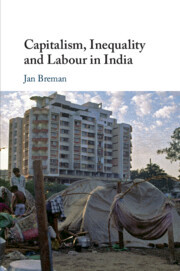Description
Capitalism, Inequality and Labour in India
Author: Breman Jan
Breman takes dispossession as his central theme in this ambitious analysis of labour bondage in India's changing political economy.
Language: English
Subject for Capitalism, Inequality and Labour in India:
Approximative price 32.87 €
In Print (Delivery period: 14 days).
Add to cart
Capitalism, Inequality and Labour in India
Publication date: 10-2022
Support: Print on demand
Publication date: 10-2022
Support: Print on demand
Approximative price 107.80 €
In Print (Delivery period: 14 days).
Add to cart
Capitalism, Inequality and Labour in India
Publication date: 08-2019
298 p. · 15.6x23.5 cm · Hardback
Publication date: 08-2019
298 p. · 15.6x23.5 cm · Hardback
Description
/li>Contents
/li>Biography
/li>
Jan Breman takes dispossession as his central theme in this ambitious analysis of labour bondage in India's changing political economy from 1962 to 2017. When, in a remote past, tribal and low-caste communities were attached to landowning households, their lack of freedom was framed as subsistence-oriented dependency. Breman argues that with colonial rule came the intrusion of capitalism into India's agrarian economy, leading to a decline in the idea of patronage in the relationship between bonded labour and landowner. Instead, servitude was reshaped as indebtedness. As labour became transformed into a commodity, peasant workers were increasingly pushed out of agriculture and the village but remained adrift in the wider economy. This footloose workforce is subjected to exploitation when their labour power is required and is left in a state of exclusion when it is surplus to demand. The outcome is progressive inequality that is thoroughly capitalist in nature.
Part I. Labour as Codified in Annals of the State: 1. The country liberated; 2. An end to servitude?; Part II. Constrained in Decrepitude: 3. The commodification of agricultural labour; 4. The class struggle launched and suppressed; 5. The Gandhian road to inclusion; Part III. The Political Economy of Boundless Dispossession: 6. The Agrarian Question posed as the social question; 7. Labour migration: going off and coming back; 8. Indebtedness as labour attachment; Part IV. Conclusion: 9. Capitalism, labour bondage and the social question.
Jan Breman is Honorary Fellow of the Institute of Social History, Amsterdam, and Emeritus Professor at the Universiteit van Amsterdam. He is the author of many publications, including Footloose Labour: Working in India's Informal Economy (1996), for which he was awarded the Edgar Graham Book prize by School of Oriental and African Studies, University of London.
© 2024 LAVOISIER S.A.S.




